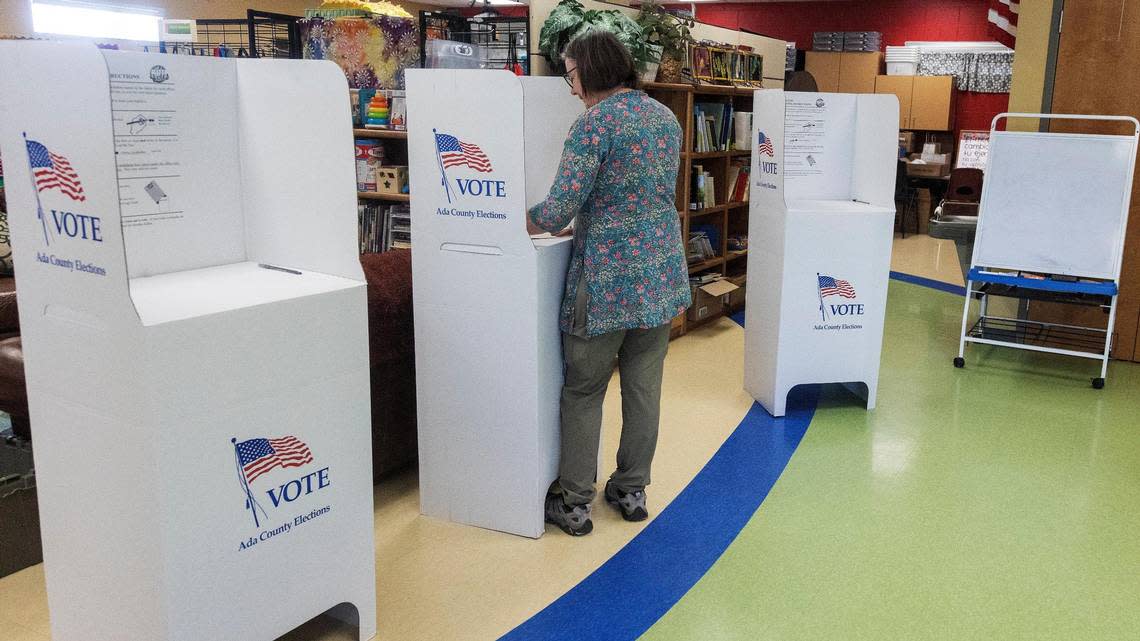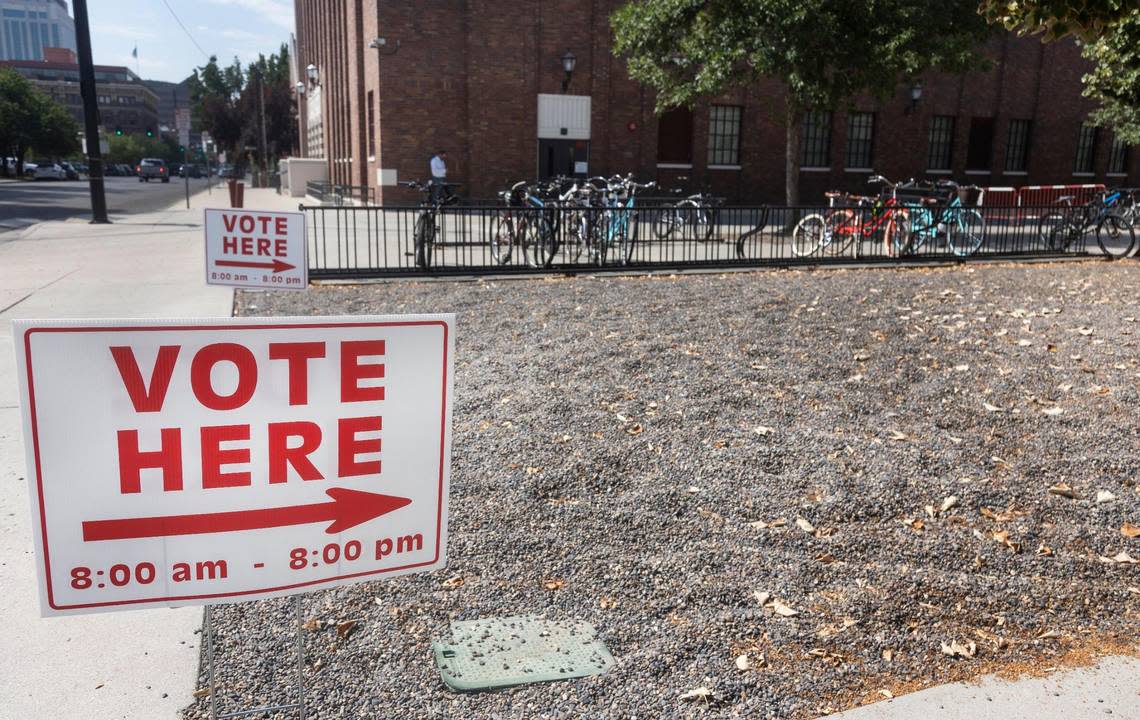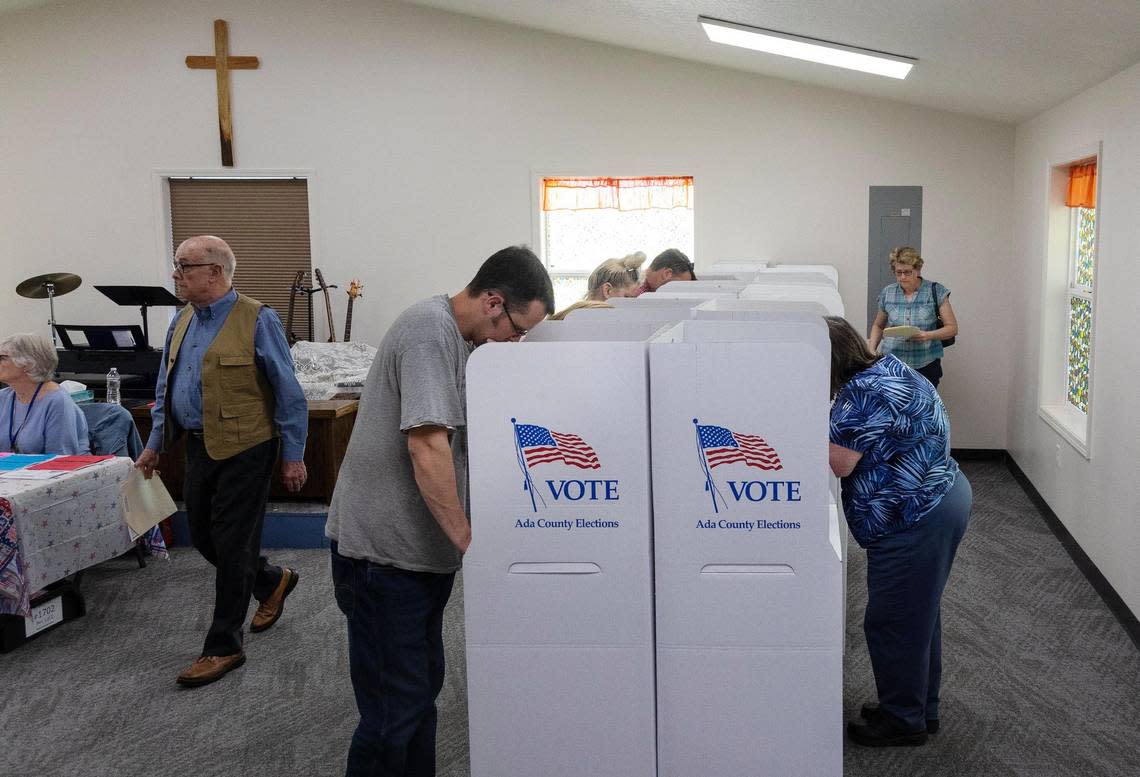How many Idahoans think Trump won the 2020 election? Our statewide poll offers a glimpse
Editor’s note: This story is part of a series on the results of an Idaho Statesman/SurveyUSA poll. Other results: abortion, education.
Nearly one in three Idaho adults believes widespread voter fraud took place in the 2020 U.S. election and that former Republican President Donald Trump truly won, according to new poll results commissioned by the Idaho Statesman.
Within the poll, conducted by independent research firm SurveyUSA on behalf of the Statesman, a nearly identical number of Idaho residents, ages 18 and above, think there were very little to no incidents of election fraud, and that Democratic President Joe Biden won fairly.
The segment saying Trump won was 29%; the portion saying Biden won was 27%.
Among the 550 survey participants across the state, 32% said there was most likely some fraud, and that Biden may or may not have won the presidential election. The final 12% of respondents said they’re unsure.
The election survey responses were part of a statewide Idaho Statesman/SurveyUSA poll on several contentious issues in the state. Results on questions related to marijuana, abortion, LGBTQ rights and other topics are being released throughout the week at IdahoStatesman.com. The poll was conducted Oct. 17-20 online and by phone, with the pool of adults surveyed weighted to U.S. Census targets for age, race, gender education level and home ownership. The election-related results have a confidence rating of approximately +/- 5 percentage points.

What the election results suggest is Idahoans are roughly split on whether Biden is the legitimate U.S. president. With 63.8% of the vote in the 2020 election, Trump coasted to victory in the deeply conservative state of Idaho, compared to 33.1% for Biden. But Biden won several key battleground states, the Electoral College and the popular vote by more than 7 million votes, as certified by all 50 U.S. states and the District of Columbia.
Factors such as age, race, gender and income level seemed to have limited influence over whether Idahoans believed Trump or Biden won the 2020 election. Education level, however, did appear to impact people’s responses.
Individuals with four-year college degrees were most likely to believe Biden won, and least likely to think Trump did, the results showed. Respondents who said they attended some college were most likely to believe Trump won and there was widespread voter fraud, followed closely by those with a high school diploma and no post-secondary education.
But the divide among survey respondents fell primarily along political lines, results showed.
Of those who self-identified as “very conservative,” 55% think Trump won the election, after the former president alleged large-scale voter fraud in several states, though no evidence of his claims has ever been produced. Just 2% of participants describing themselves with that political ideology thought Biden truly won, while 40% said there was some fraud, but that Biden may or may not have defeated Trump.
The percentage of respondents who said they are registered Republicans and believe Trump actually won the election was slightly lower, at 43%. Another 37% of Republicans said Biden may or may not have won the election, as a result of some voter fraud, with 10% of GOP members responding that Biden won with little to no voter fraud.
The poll also showed the opposite was true among those who said they are Democrats or labeled themselves politically liberal. Of those subgroups, 92% of liberals said Biden won, with 85% of Democrats saying they feel the same. Just 6% of Democrats said Trump actually won, and 1% of liberals.
Election skepticism could have long-term impact
The survey results are not surprising to Thania Sanchez, senior vice president of research and policy development with States United Action. The Washington, D.C.-based nonpartisan group tracks election misinformation and threats to the American democracy, including Trump’s false claims that the 2020 election was stolen.
“It’s very large, especially among Republicans,” Sanchez told the Statesman in a phone interview, of similar polling data measuring beliefs that Trump won. “Overall, there’s something like 30% to 35% of American people who believe that. That’s concerning, but what is more concerning is that a larger group of people who think Biden won the election still think there’s a lot of fraud and problems in our electoral system — that’s across Democrats, Republicans and independents.”
The election denial efforts undertaken by bad actors immediately following the 2020 election were not only designed to force audits and recounts, but also sow greater doubts about the nation’s overarching voting process, Sanchez said.
“Even if it didn’t find anything, it’s implanting distrust in our system, which is part of what they were trying to do — create a lot of noise so people are confused and not sure what to think,” she said. “It makes the environment ripe for misinformation. It’s just wild, and outside the reality that fraud is very, very rare. But a growing number of people have less trust in our elections, and it harms our democracy.”

Melodie Denton, 45, recently relocated from Boise to Salmon and identifies herself as a conservative-leaning Republican. She said she quit watching or reading news sources after the 2020 election, and instead receives information from fellow internet livestream participants, TikTok and dating apps with social media components. Denton responded in the survey that major fraud occurred and that Trump actually won.
“I honestly feel the election was stolen from Trump and given to Biden,” she told the Statesman by phone in a follow-up interview. “I don’t think Idaho was the big problem, I think it was other states across our nation. Idaho isn’t as guilty of that, but it really made me start distrusting the government as a whole, because when you break one cogwheel it starts breaking down the others.”
Dorothy Moon, the former three-term Republican state representative from Stanley and newly elected chair of the Idaho Republican Party, has championed similar ideas.
Moon lost her primary race earlier this year to become the Republican nominee for Idaho secretary of state, but shared her concerns about purported election fraud in May at a political rally in Meridian. She said she was one of 40 Idaho lawmakers to sign onto a support letter for a Texas lawsuit that contested election results in four battleground states in the 2020 election, which the U.S. Supreme Court threw out over a lack of standing.
“I went around the state and visited with many of you and found out all kinds of things that were going on in our elections,” Moon told the crowd. “Maybe they’re not as bad as what happened in the battleground states, but guess what? Little things become big things.”
Chad Houck, Idaho chief deputy secretary of state, told the Statesman that Moon’s claims of irregularities in the 2020 election are unfounded.
“We had nothing systemic, nothing at scale and certainly nothing that turned the result of an election,” Houck said by phone. “We always find one or two or three individuals who attempted to vote twice across the state, or once in Idaho and another state. It’s rare to have nothing of that nature. But to see people voting in notable volumes, no.”
More than 878,500 ballots were cast in Idaho’s 2020 general election. Of those, the state’s 44 counties identified 49 total instances of possible voter fraud that they reported to the secretary of state’s office, Houck said. Upon investigation, most of those were cleared up quickly as minor procedural or administrative issues, he said.
Knowingly voting more than once in Idaho, including casting a deceased person’s ballot, is grounds for prosecution up to a felony charge, Houck added.
Respondents express confidence in Idaho elections
Survey respondents suggested they have fewer concerns about elections in Idaho than those across the nation. A combined 85% of those polled reported having a high to moderate level of trust that the state’s elections are counted accurately. Another combined 12% said they have little to no trust in Idaho’s elections, with 3% responding that they weren’t sure.

Laurie Crawford-Bradley, 60, of Boise, said she’s politically moderate and registered as an unaffiliated voter. She responded in the survey that she has a high level of confidence in the accuracy of Idaho elections, and told the Statesman in a follow-up interview that she’s been given no reason to question the state’s voting processes.
“I don’t think (people) know how to defraud the election, vote under a dead person’s name or whatever they claim happened,” Crawford-Bradley said by phone. “It takes more energy than they’re willing to expend to do that, for one extra vote. It’s hard enough to get people to go voting, they’re not going to vote twice.”
A Biden supporter, Crawford-Bradley vented frustration that so many of her fellow Idahoans continue to back Trump, and his unsubstantiated claims that he won the 2020 U.S. election. No matter one’s political leanings or affiliation, sometimes you win and sometimes you lose an election, she said, and when you lose, you have to accept the results and put forth a better candidate next time around.
“They need to stop following him, buying all of his merchandise and believing everything he says is gospel,” Crawford-Bradley said, referencing Trump. “I’ve always been a freethinker and always spoke my mind. If you don’t like it, that’s what America gives us — a right to agree and a right to disagree.”





